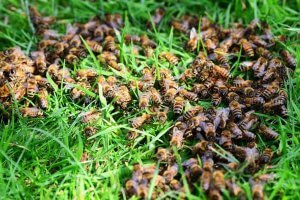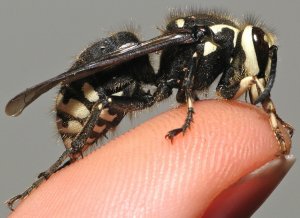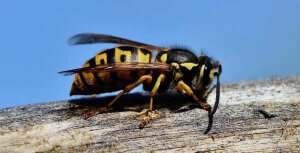It’s that time of year again when the ground kissed by the warm sun turns lush and green, and colorful blooms adorn well tended gardens and walkways.
Spring is pretty, but it also portends fast-approaching problems in terms of unwanted stinging critters, like wasps and hornets seeking asylum and food on Pittsburgh properties where they interface with humans and can cause multiple problems.
Keeping them away from homes often requires the help of the pest-management and pest-control specialists at Pestco Professional Services – (412) 252-5200 – who have 70-plus years of experience of stinging insect control and removal, but it is a process that must begin before that horde arrives and takes hold, and that old boy scout marching song about being prepared should be remembered here, because it can help.
Why Do Stinging Insects Return In The Spring
While richly hued flowers, verdant lawns, warmer temperatures and robin red breasts on the wing may be the true harbingers of spring, so is the seemingly sudden influx of stinging hornets, wasps and bees buzzing around residential lawns.
While wasps and hornets nest differently, they do share similar life cycles in the sense that workers and males die off in the fall or winter, and only the mated queens survive by hibernating and starting new nests each spring. They never return to older breeding grounds.
Stinging insects that create nests in trees, bushes, and shrubs will also roost inside a home. They will build structures under overhangs, in rafters, under decks and in other locations.
Those insects that use holes in which to construct their nests will duplicate their actions in the voids found in man-made structures, and any weak entry point they can penetrate inside walls, ceilings and attics can become sites for new living quarters.
The Most Common Stinging Insects
Bees, wasps and fire ants are the most common stinging insects. Honeybees are extremely beneficial to humanity because they pollinate nearly one in every three bites of the food we eat at our tables every day, which is why we opt for relocating their hives as opposed to extermination.
Their work includes: apples, cranberries, melons and broccoli. Some crops, including blueberries and cherries, are 90-percent dependent on honey bees and almonds depend entirely on the honey bee for pollination.
Although bees are industrious, social creatures and most aren’t likely to sting unless their shelter is threatened, African honeybees, aka killer bees, are more aggressive and are known to attack in lethal swarms.

Wasps are a large, diverse insect family that includes yellow jackets and hornets. Some species are relatively harmless, but that is not the case with yellow jackets.
They congregate and scavenge at outdoor picnics and such, which are more and more prevalent as the warmer weather emerges.
Hornets are larger than yellow jackets and build football-shaped nests in trees, and shrubs and under eaves. Some varieties are as aggressive as yellow jackets, but others, such as paper wasps, are not.
Fire ants are quickly gaining ground in areas beyond their usual habitat in the American Southeast and Texas.
They are known to construct nests in the dirt where a hapless homeowner can easily step on them. They are known to attack en masse, numbering in the hundreds, and a single fire ant can sting multiple times.
Wasps, Hornets, Yellow Jackets And Bees In The Spring
Hornet and wasp queens hibernate beneath leaves, under bark, in rock crevices or in burrows and between boards in an attic or within gaps in leaky windows.
They awaken with the advent of warmer temperatures and begin construction on new nests. These queens gather their own labor force by creating several chambers and filling them with eggs.
If a Pittsburgh homeowner notices wasps flying back and forth from any kind of opening in their home of garage, they should notify our pest-control and pest-management specialists immediately — (412) 252-5200.

Explore 9 horrifying facts about the Bald-Faced Hornet.
The Danger of Stinging Insects
While many people may believe that these insects lose their stinger after one application, that’s not always the case. Yellow jackets, for example, can attack multiple times, making them very dangerous to any person who comes in contact with them.
They create other problems as well, especially when they roost either close to a home’s entrance or in an area of the yard that is heavily trafficked. Outdoor meals draw unwanted company as these insects are very attracted to human food, especially sugary foods and beverages.
The two greatest risks associated with insect stings are the possibility of an allergic reaction (which can be fatal to some people) and infection (more common and less serious).
Although most insect stings tend to cause only minor soreness and irritation, they can be both alarming and painful and can occur anywhere on the body. Most stings are from yellow jackets and honey bees. The bites of fire ants can also be very nasty and often subject to infection.

Learn about other Spring time pests to protect your home or business against.
Reducing the Possibility of Insect Stings While Outdoors
We often warn our valued clientele of some things they can do to lower the risk of getting stung by invading spring insects. For one, avoid using perfume, hair spray and other scented items; for another, abstain from wearing brightly colored clothing.
Do not venture outside barefoot or worse, while wearing sandals in the grass. Buy and use a good quality insect repellant. If a stinging insect approaches, back away slowly and walk away as calmly as possible. (You can always scream when you are safely inside.)
If you have an allergy to stings, be prepared and always carry an EpiPen and wear a medical bracelet bearing this information.
Lastly, let common sense prevail and stay away from sites where hives and nests are in view. If they are on your property, call our pest-management and pest-control specialists and have them removed as soon as possible.
5 Tips For Keeping Stinging Insects Off Property
Inspect Property And Seal Up Openings
Early spring is the best time to seal up any openings and potential entry points because wasp queens have not yet begun their constructions. A caulking gum can be used to fill in cracks often found in garages, sheds and along the exterior walls of a residence. Don’t forget to fill in with soil any rodent borrows that may be near the home and check all screen doors for holes. Seal off access to the under part of a porch or deck by applying wire screen.
Never Leave Sugary Drinks Or Food items Outside
Adult yellow jackets particularly crave sugar because a hive process that naturally provides it diminishes over time. Stinging insects are very attracted to sweet foods and drinks, which is why Pittsburgh homeowners should never leave them out in the yard, or on the deck or patio.
Avoid Wearing Perfumes And Scented Lotions When Outdoors
Sweet scents and cologne, perfume or scented shampoos, soaps and deodorants should be avoided when spending time outdoors. Also, bananas and banana-scented toiletries are known to attract stinging insects.
Always Cover Or Properly Seal Trash Cans
Soda cans, which often retain bits of sugar on their edges, and other trash act a magnets to yellow jackets, honey bees and other unwanted pests such as rats and mice.
Use Pestco To Develop An Inspection Plan
While homeowners are certainly capable of performing routine inspections, pest-management and pest-control experts should still be called upon to implement an effective course of action going forward with scheduled visits and helpful advice as to how to keep unwanted pests from ever returning to your residential property.
Pittsburgh Pest Control And Pest Management Services
For the greater Pittsburgh area, there is no better residential pest-control and pest-management service than that provided by our teams at Pestco Professional Services.
There are currently seven ACE-certified technicians throughout Western Pennsylvania and two of those are a part of our Pestco Professional Services family. This, combined with our Quality Pro-certification and well over seven decades of continuous operation, make us one the most qualified pest control and pest management companies in all of Western Pennyslvania for home owners and business owners.
For years, we have maintained a stellar reputation as a full service provider control for high profile commercial enterprise such as Heinz Field and PNC Park, and under the leadership of our new executive general manager named Bob Wiemer, we have moved towards including residential pest-control services for the greater Pittsburgh areas.

Our integrated pest control and pest management services are performed by highly knowledgeable, expert technicians, who attend company workshops to ensure they are always a few steps ahead of the pests they encounter. The very first thing or teams do is thoroughly inspect your residence for vulnerable areas and reinforce them against invading pests wherever possible.
There is no substitute for professional judgment since there are some areas in every home that must remain ventilated and open to some extent. Air currents can be alluring to pests, as they have seasonally appealing temperatures (cool in the summer, warm in the winter), and they can carry the scent of food being prepared inside.
Our integrated pest management services are cost-effective and safe for the environment because their products are 100% sustainable and their solutions are based upon both biology and the natural life cycle of pests.
So call our team today – (412) 252-5200 – and let us help you with any pest control or pest management issues you may have experienced. Even if there have been no problems as of yet, there is no guarantee that there won’t be in the near future. To ensure peace of mind, let us transform your home into a pest-free place to both live and and visit.
5 Tips For Keeping Stinging Insects Off Your Lawn
1) Inspect your property and seal up any openings
2) Never leave sugary drinks or food items outside
3) Avoid wearing perfumes and scented lotions when outdoors
4) Always cover or properly seal trash cans
5) Use Pestco to develop an inspection plan
 Over 300 Reviews
Over 300 Reviews 